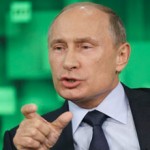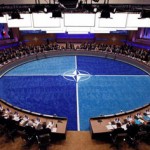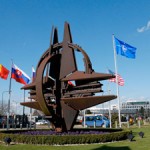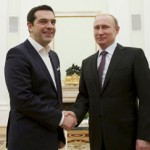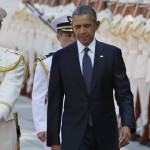Did Putin Just Blink?

Russian President Vladimir Putin has made an art of keeping his detractors off-balance from the start of the crisis in Ukraine. Today, he had even pro-Russian separatists lost for words when he called on them to postpone a May 11 referendum on how to federalize the country.
Only Putin and a small coterie of advisers know what is behind his new position on the referendum. It may be a cynical piece of theater, the purpose of which will become clear only later. But there is just enough reason to hope it isn’t, given that he also appeared to give conditional approval for Ukraine’s presidential elections on May 25, which until now he has sought to derail.
Here is what I hope his statement signifies: First, that Putin doesn’t want to invade Ukraine. It has always seemed unlikely that invasion was his goal, but with forces ready on the border, it could never be ruled out. (Indeed, although Putin said today that Russian troops had withdrawn from the border, NATO officials said they had not.)
It has been almost a week since about 40 pro-Russians in Odessa were killed during clashes with pro-unity Ukrainians. It has been even longer since Ukraine’s military ignored Russian threats of intervention to push ahead with efforts to forcibly subdue separatists in their strongholds in eastern Ukraine. These developments gave Putin ready excuses to invade, yet he has chosen not to use them.
I hope, secondly, that having decided not to invade Ukraine, Putin also doesn’t want to trigger a civil war there. Putin will be well aware that a disputed status referendum can act as a trigger for conflict. The spark for the war in Bosnia, for example, was a 1992 referendum on independence from Yugoslavia that Bosnian Serbs were bound to lose, because they were less numerous than Bosnian Muslims and Croats.
Similarly, a vote in eastern Ukraine on May 11 — two days after the holiday celebrating the Soviet victory over fascism in World War II — looks like a match held over tinder.
Although European leaders are clearly reluctant to impose harsh economic sanctions against Russia, Putin wouldn’t want to see bloodshed that is outside his control finally prod them to action. In such a case, he would risk facing the cost of invasion without the benefits.
Finally, I hope Putin’s new stance means he has recognized that the inconsistencies of Russia’s position were becoming untenable. Foreign Minister Sergei Lavrov has been positioning Russia as the proponent of solving the crisis through dialogue between Ukrainian factions. Like Putin, he also challenged the idea that legitimate presidential elections could be held May 25, given the presence of troops and violence in the east. Putin’s spokesman called the idea “absurd.”
So how would Russia support the legitimacy of a referendum held under those same conditions two weeks earlier?
Any peaceful solution to the crisis in Ukraine will have to involve both the separatists in eastern Ukraine and Russia, as unpalatable as that may seem to many in Kiev, given the cynical way Putin has exploited the situation to gain his place at the table. It is too early to start sketching out the details of a deal, or perhaps even to hope that Putin is stepping back from confrontation. But his call today can open the door to ending the crisis if he wants it to.
Author: Marc Champion writes editorials on international affairs. He was previously Istanbul bureau chief for the Wall Street Journal. He was also an editor at the Financial Times and the editor-in-chief of the Moscow Times. He is based in London.
Source: bloomberg









